An Analysis of the Financial Implications of China in Africa
VerifiedAdded on 2021/01/15
|36
|10727
|282
Report
AI Summary
This report analyzes the financial implications of China's Foreign Direct Investment (FDI) in Africa, exploring the benefits, disadvantages, and challenges associated with this economic relationship. The study investigates how Chinese investment, driven primarily by the need for natural resources, impacts African economies, focusing on improvements in productivity, employment, and living standards. The research addresses key questions regarding the advantages and disadvantages of China's financial involvement, as well as the challenges China faces in its operations within African countries. The report includes an executive summary, literature review, methodology, findings, and conclusion, offering insights into the evolving dynamics of globalization and its impact on the economic landscape of Africa. The report highlights the significance of FDI for African economic development and suggests strategies for attracting investment to improve work conditions, living standards, and overall GDP in African economies. The study also considers the role of globalization and the impact of Chinese investment on various African nations, including Nigeria, Republic of Congo, Kenya, and Ethiopia.
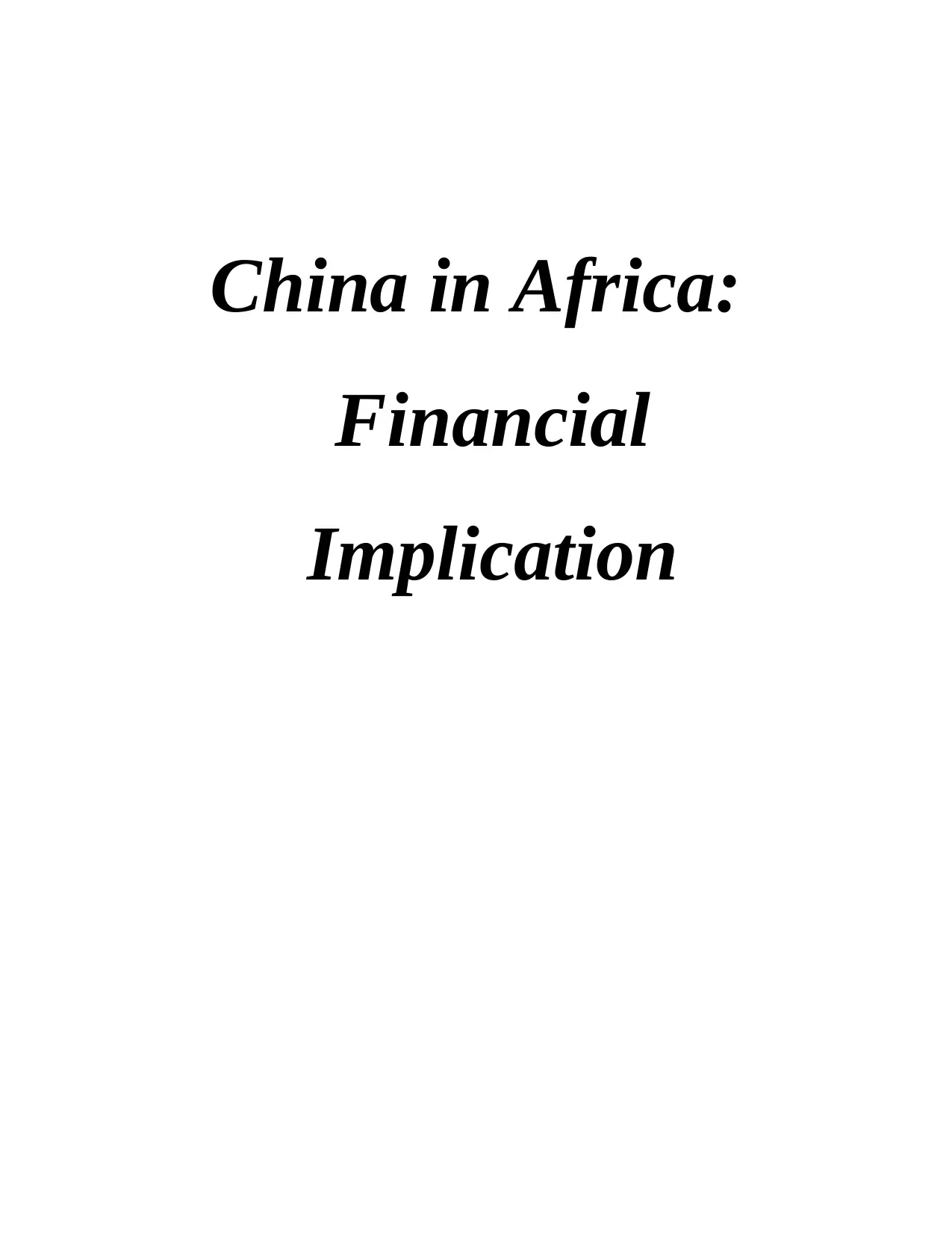
China in Africa:
Financial
Implication
Financial
Implication
Paraphrase This Document
Need a fresh take? Get an instant paraphrase of this document with our AI Paraphraser

ACKNOWLEDGEMENT
Throughout the writing of this dissertation, I received a great deal of support an
assistance. I would firstly like to extend my gratitude towards my Supervisor whose immense
knowledge in the field contributed invaluable insights while formulating my study, specifically
the research topic and methodology. Finally, I would like to show my heartfelt gratitude towards
my family, friends as well as tutors among others who were there to lend me an ear when I
needed one and help me sail through this dissertation smoothly all this while.
Throughout the writing of this dissertation, I received a great deal of support an
assistance. I would firstly like to extend my gratitude towards my Supervisor whose immense
knowledge in the field contributed invaluable insights while formulating my study, specifically
the research topic and methodology. Finally, I would like to show my heartfelt gratitude towards
my family, friends as well as tutors among others who were there to lend me an ear when I
needed one and help me sail through this dissertation smoothly all this while.
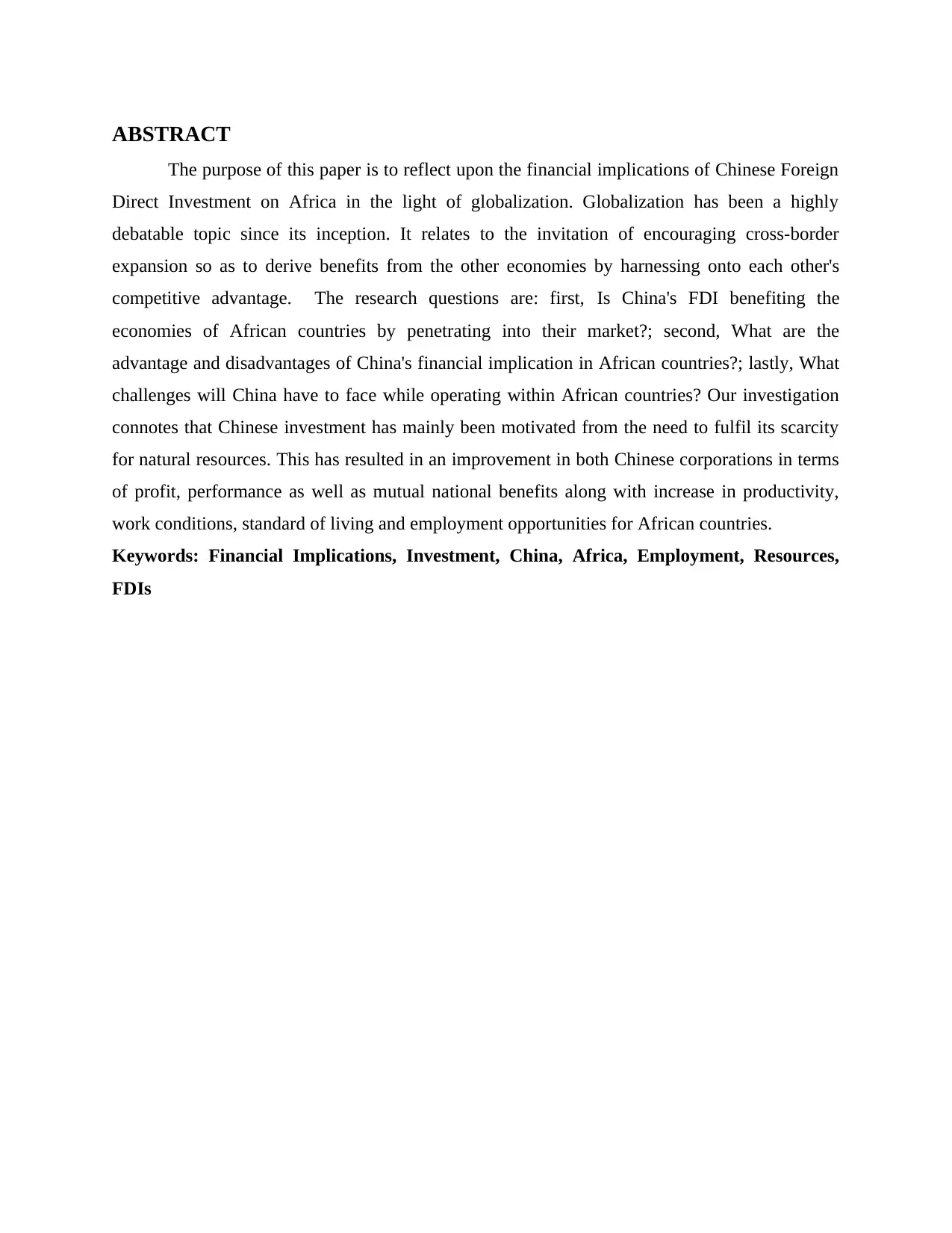
ABSTRACT
The purpose of this paper is to reflect upon the financial implications of Chinese Foreign
Direct Investment on Africa in the light of globalization. Globalization has been a highly
debatable topic since its inception. It relates to the invitation of encouraging cross-border
expansion so as to derive benefits from the other economies by harnessing onto each other's
competitive advantage. The research questions are: first, Is China's FDI benefiting the
economies of African countries by penetrating into their market?; second, What are the
advantage and disadvantages of China's financial implication in African countries?; lastly, What
challenges will China have to face while operating within African countries? Our investigation
connotes that Chinese investment has mainly been motivated from the need to fulfil its scarcity
for natural resources. This has resulted in an improvement in both Chinese corporations in terms
of profit, performance as well as mutual national benefits along with increase in productivity,
work conditions, standard of living and employment opportunities for African countries.
Keywords: Financial Implications, Investment, China, Africa, Employment, Resources,
FDIs
The purpose of this paper is to reflect upon the financial implications of Chinese Foreign
Direct Investment on Africa in the light of globalization. Globalization has been a highly
debatable topic since its inception. It relates to the invitation of encouraging cross-border
expansion so as to derive benefits from the other economies by harnessing onto each other's
competitive advantage. The research questions are: first, Is China's FDI benefiting the
economies of African countries by penetrating into their market?; second, What are the
advantage and disadvantages of China's financial implication in African countries?; lastly, What
challenges will China have to face while operating within African countries? Our investigation
connotes that Chinese investment has mainly been motivated from the need to fulfil its scarcity
for natural resources. This has resulted in an improvement in both Chinese corporations in terms
of profit, performance as well as mutual national benefits along with increase in productivity,
work conditions, standard of living and employment opportunities for African countries.
Keywords: Financial Implications, Investment, China, Africa, Employment, Resources,
FDIs
⊘ This is a preview!⊘
Do you want full access?
Subscribe today to unlock all pages.

Trusted by 1+ million students worldwide
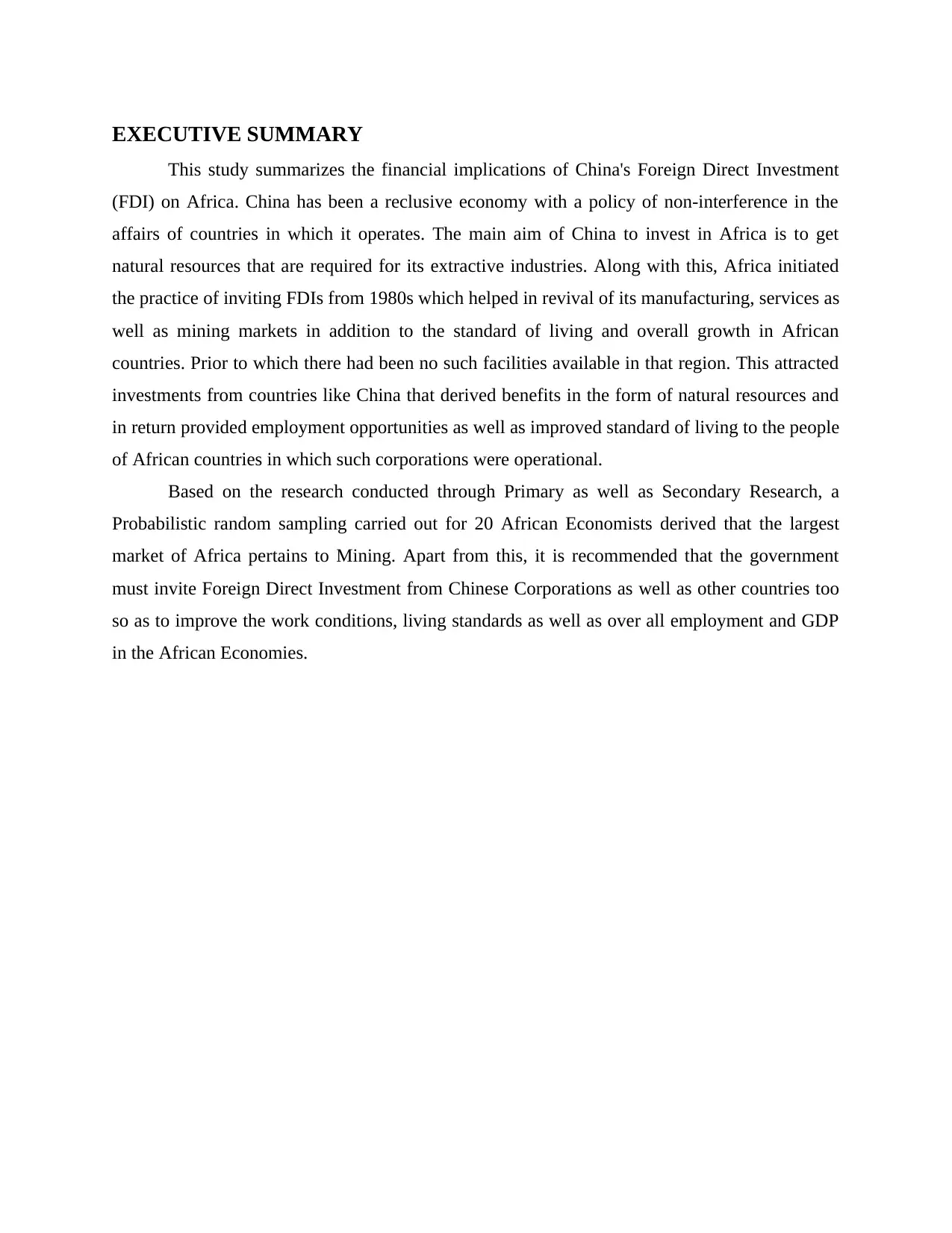
EXECUTIVE SUMMARY
This study summarizes the financial implications of China's Foreign Direct Investment
(FDI) on Africa. China has been a reclusive economy with a policy of non-interference in the
affairs of countries in which it operates. The main aim of China to invest in Africa is to get
natural resources that are required for its extractive industries. Along with this, Africa initiated
the practice of inviting FDIs from 1980s which helped in revival of its manufacturing, services as
well as mining markets in addition to the standard of living and overall growth in African
countries. Prior to which there had been no such facilities available in that region. This attracted
investments from countries like China that derived benefits in the form of natural resources and
in return provided employment opportunities as well as improved standard of living to the people
of African countries in which such corporations were operational.
Based on the research conducted through Primary as well as Secondary Research, a
Probabilistic random sampling carried out for 20 African Economists derived that the largest
market of Africa pertains to Mining. Apart from this, it is recommended that the government
must invite Foreign Direct Investment from Chinese Corporations as well as other countries too
so as to improve the work conditions, living standards as well as over all employment and GDP
in the African Economies.
This study summarizes the financial implications of China's Foreign Direct Investment
(FDI) on Africa. China has been a reclusive economy with a policy of non-interference in the
affairs of countries in which it operates. The main aim of China to invest in Africa is to get
natural resources that are required for its extractive industries. Along with this, Africa initiated
the practice of inviting FDIs from 1980s which helped in revival of its manufacturing, services as
well as mining markets in addition to the standard of living and overall growth in African
countries. Prior to which there had been no such facilities available in that region. This attracted
investments from countries like China that derived benefits in the form of natural resources and
in return provided employment opportunities as well as improved standard of living to the people
of African countries in which such corporations were operational.
Based on the research conducted through Primary as well as Secondary Research, a
Probabilistic random sampling carried out for 20 African Economists derived that the largest
market of Africa pertains to Mining. Apart from this, it is recommended that the government
must invite Foreign Direct Investment from Chinese Corporations as well as other countries too
so as to improve the work conditions, living standards as well as over all employment and GDP
in the African Economies.
Paraphrase This Document
Need a fresh take? Get an instant paraphrase of this document with our AI Paraphraser
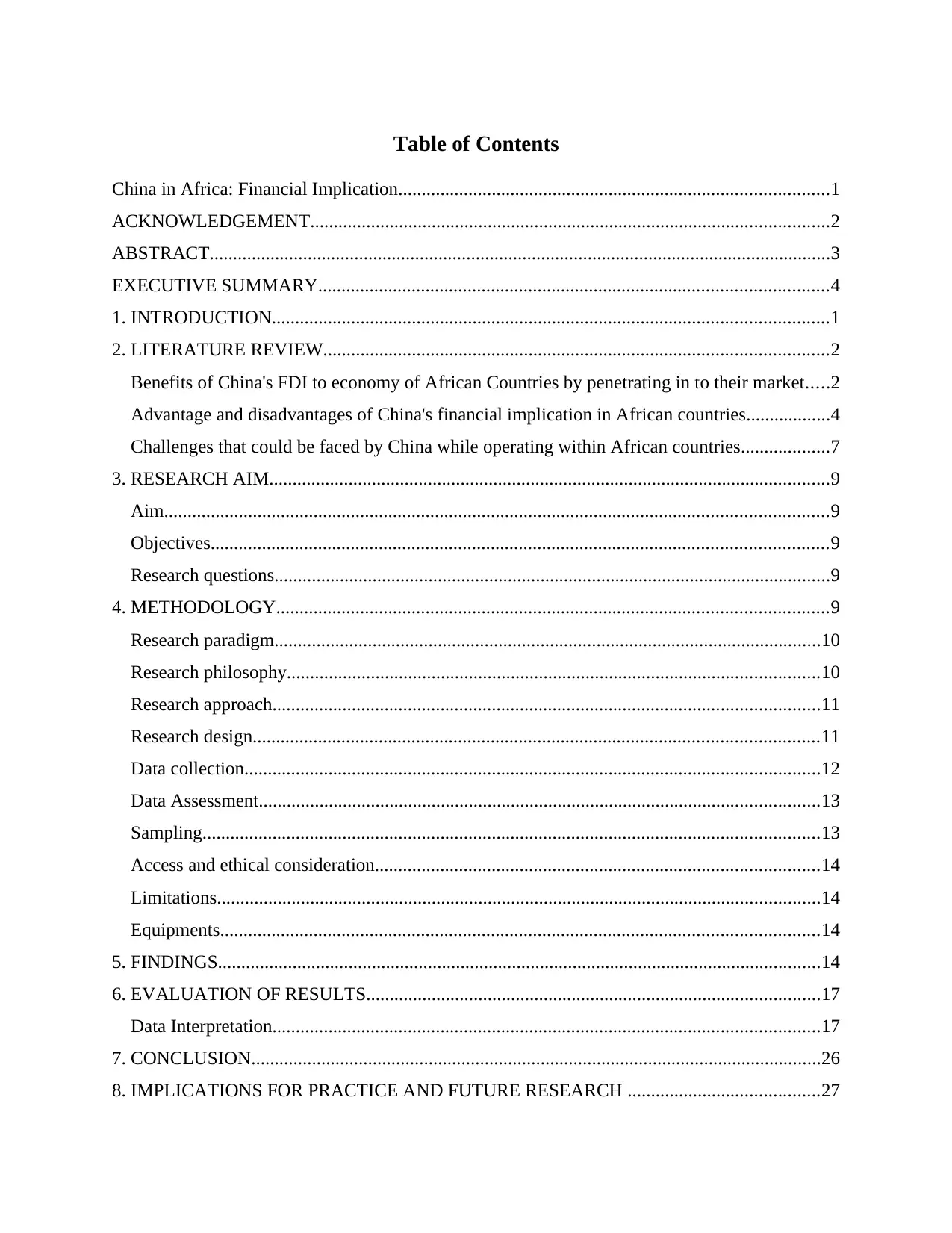
Table of Contents
China in Africa: Financial Implication............................................................................................1
ACKNOWLEDGEMENT...............................................................................................................2
ABSTRACT.....................................................................................................................................3
EXECUTIVE SUMMARY.............................................................................................................4
1. INTRODUCTION.......................................................................................................................1
2. LITERATURE REVIEW............................................................................................................2
Benefits of China's FDI to economy of African Countries by penetrating in to their market.....2
Advantage and disadvantages of China's financial implication in African countries..................4
Challenges that could be faced by China while operating within African countries...................7
3. RESEARCH AIM........................................................................................................................9
Aim..............................................................................................................................................9
Objectives....................................................................................................................................9
Research questions.......................................................................................................................9
4. METHODOLOGY......................................................................................................................9
Research paradigm.....................................................................................................................10
Research philosophy..................................................................................................................10
Research approach.....................................................................................................................11
Research design.........................................................................................................................11
Data collection...........................................................................................................................12
Data Assessment........................................................................................................................13
Sampling....................................................................................................................................13
Access and ethical consideration...............................................................................................14
Limitations.................................................................................................................................14
Equipments................................................................................................................................14
5. FINDINGS.................................................................................................................................14
6. EVALUATION OF RESULTS.................................................................................................17
Data Interpretation.....................................................................................................................17
7. CONCLUSION..........................................................................................................................26
8. IMPLICATIONS FOR PRACTICE AND FUTURE RESEARCH .........................................27
China in Africa: Financial Implication............................................................................................1
ACKNOWLEDGEMENT...............................................................................................................2
ABSTRACT.....................................................................................................................................3
EXECUTIVE SUMMARY.............................................................................................................4
1. INTRODUCTION.......................................................................................................................1
2. LITERATURE REVIEW............................................................................................................2
Benefits of China's FDI to economy of African Countries by penetrating in to their market.....2
Advantage and disadvantages of China's financial implication in African countries..................4
Challenges that could be faced by China while operating within African countries...................7
3. RESEARCH AIM........................................................................................................................9
Aim..............................................................................................................................................9
Objectives....................................................................................................................................9
Research questions.......................................................................................................................9
4. METHODOLOGY......................................................................................................................9
Research paradigm.....................................................................................................................10
Research philosophy..................................................................................................................10
Research approach.....................................................................................................................11
Research design.........................................................................................................................11
Data collection...........................................................................................................................12
Data Assessment........................................................................................................................13
Sampling....................................................................................................................................13
Access and ethical consideration...............................................................................................14
Limitations.................................................................................................................................14
Equipments................................................................................................................................14
5. FINDINGS.................................................................................................................................14
6. EVALUATION OF RESULTS.................................................................................................17
Data Interpretation.....................................................................................................................17
7. CONCLUSION..........................................................................................................................26
8. IMPLICATIONS FOR PRACTICE AND FUTURE RESEARCH .........................................27

9. BIBLIOGRAPHY......................................................................................................................29
⊘ This is a preview!⊘
Do you want full access?
Subscribe today to unlock all pages.

Trusted by 1+ million students worldwide
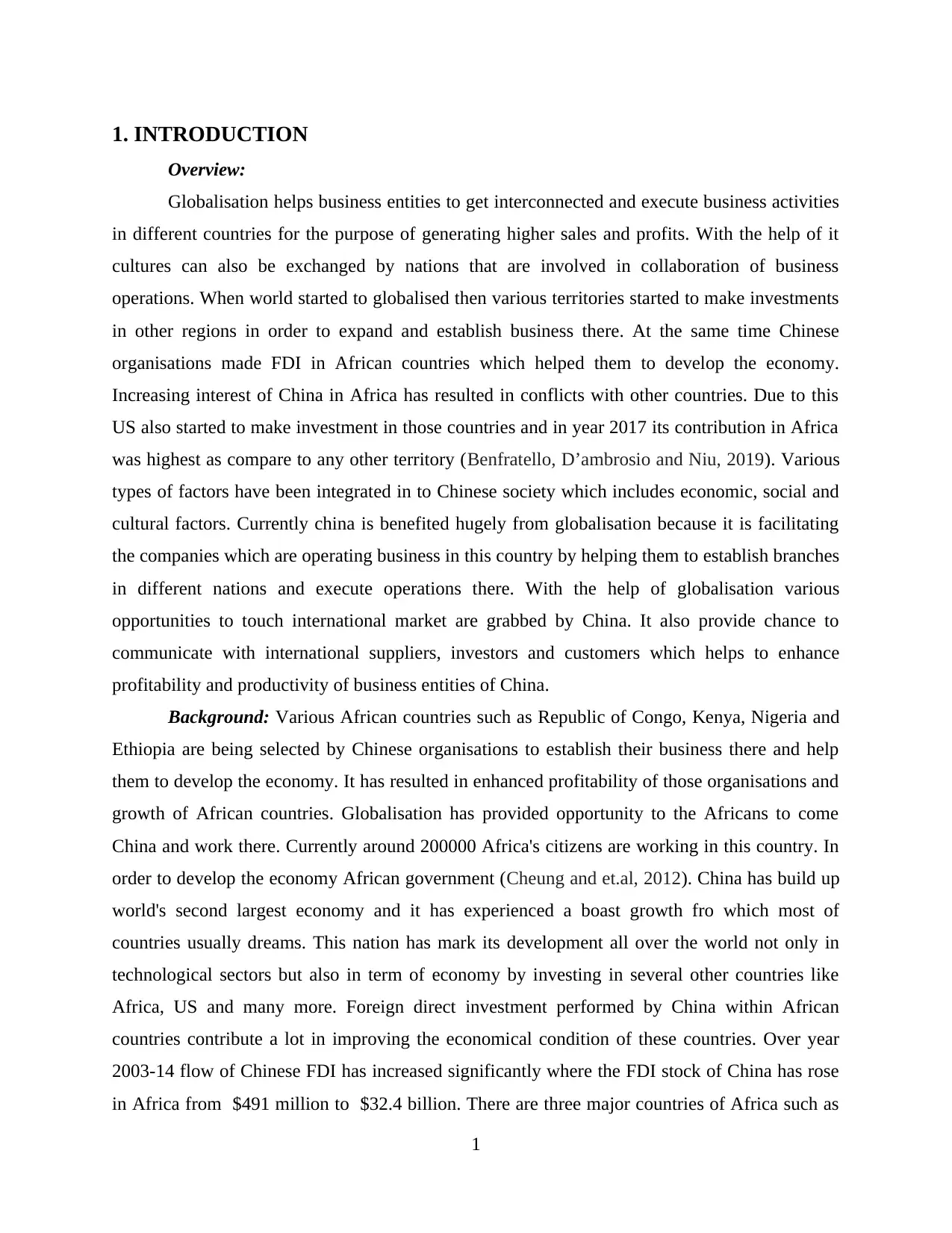
1. INTRODUCTION
Overview:
Globalisation helps business entities to get interconnected and execute business activities
in different countries for the purpose of generating higher sales and profits. With the help of it
cultures can also be exchanged by nations that are involved in collaboration of business
operations. When world started to globalised then various territories started to make investments
in other regions in order to expand and establish business there. At the same time Chinese
organisations made FDI in African countries which helped them to develop the economy.
Increasing interest of China in Africa has resulted in conflicts with other countries. Due to this
US also started to make investment in those countries and in year 2017 its contribution in Africa
was highest as compare to any other territory (Benfratello, D’ambrosio and Niu, 2019). Various
types of factors have been integrated in to Chinese society which includes economic, social and
cultural factors. Currently china is benefited hugely from globalisation because it is facilitating
the companies which are operating business in this country by helping them to establish branches
in different nations and execute operations there. With the help of globalisation various
opportunities to touch international market are grabbed by China. It also provide chance to
communicate with international suppliers, investors and customers which helps to enhance
profitability and productivity of business entities of China.
Background: Various African countries such as Republic of Congo, Kenya, Nigeria and
Ethiopia are being selected by Chinese organisations to establish their business there and help
them to develop the economy. It has resulted in enhanced profitability of those organisations and
growth of African countries. Globalisation has provided opportunity to the Africans to come
China and work there. Currently around 200000 Africa's citizens are working in this country. In
order to develop the economy African government (Cheung and et.al, 2012). China has build up
world's second largest economy and it has experienced a boast growth fro which most of
countries usually dreams. This nation has mark its development all over the world not only in
technological sectors but also in term of economy by investing in several other countries like
Africa, US and many more. Foreign direct investment performed by China within African
countries contribute a lot in improving the economical condition of these countries. Over year
2003-14 flow of Chinese FDI has increased significantly where the FDI stock of China has rose
in Africa from $491 million to $32.4 billion. There are three major countries of Africa such as
1
Overview:
Globalisation helps business entities to get interconnected and execute business activities
in different countries for the purpose of generating higher sales and profits. With the help of it
cultures can also be exchanged by nations that are involved in collaboration of business
operations. When world started to globalised then various territories started to make investments
in other regions in order to expand and establish business there. At the same time Chinese
organisations made FDI in African countries which helped them to develop the economy.
Increasing interest of China in Africa has resulted in conflicts with other countries. Due to this
US also started to make investment in those countries and in year 2017 its contribution in Africa
was highest as compare to any other territory (Benfratello, D’ambrosio and Niu, 2019). Various
types of factors have been integrated in to Chinese society which includes economic, social and
cultural factors. Currently china is benefited hugely from globalisation because it is facilitating
the companies which are operating business in this country by helping them to establish branches
in different nations and execute operations there. With the help of globalisation various
opportunities to touch international market are grabbed by China. It also provide chance to
communicate with international suppliers, investors and customers which helps to enhance
profitability and productivity of business entities of China.
Background: Various African countries such as Republic of Congo, Kenya, Nigeria and
Ethiopia are being selected by Chinese organisations to establish their business there and help
them to develop the economy. It has resulted in enhanced profitability of those organisations and
growth of African countries. Globalisation has provided opportunity to the Africans to come
China and work there. Currently around 200000 Africa's citizens are working in this country. In
order to develop the economy African government (Cheung and et.al, 2012). China has build up
world's second largest economy and it has experienced a boast growth fro which most of
countries usually dreams. This nation has mark its development all over the world not only in
technological sectors but also in term of economy by investing in several other countries like
Africa, US and many more. Foreign direct investment performed by China within African
countries contribute a lot in improving the economical condition of these countries. Over year
2003-14 flow of Chinese FDI has increased significantly where the FDI stock of China has rose
in Africa from $491 million to $32.4 billion. There are three major countries of Africa such as
1
Paraphrase This Document
Need a fresh take? Get an instant paraphrase of this document with our AI Paraphraser
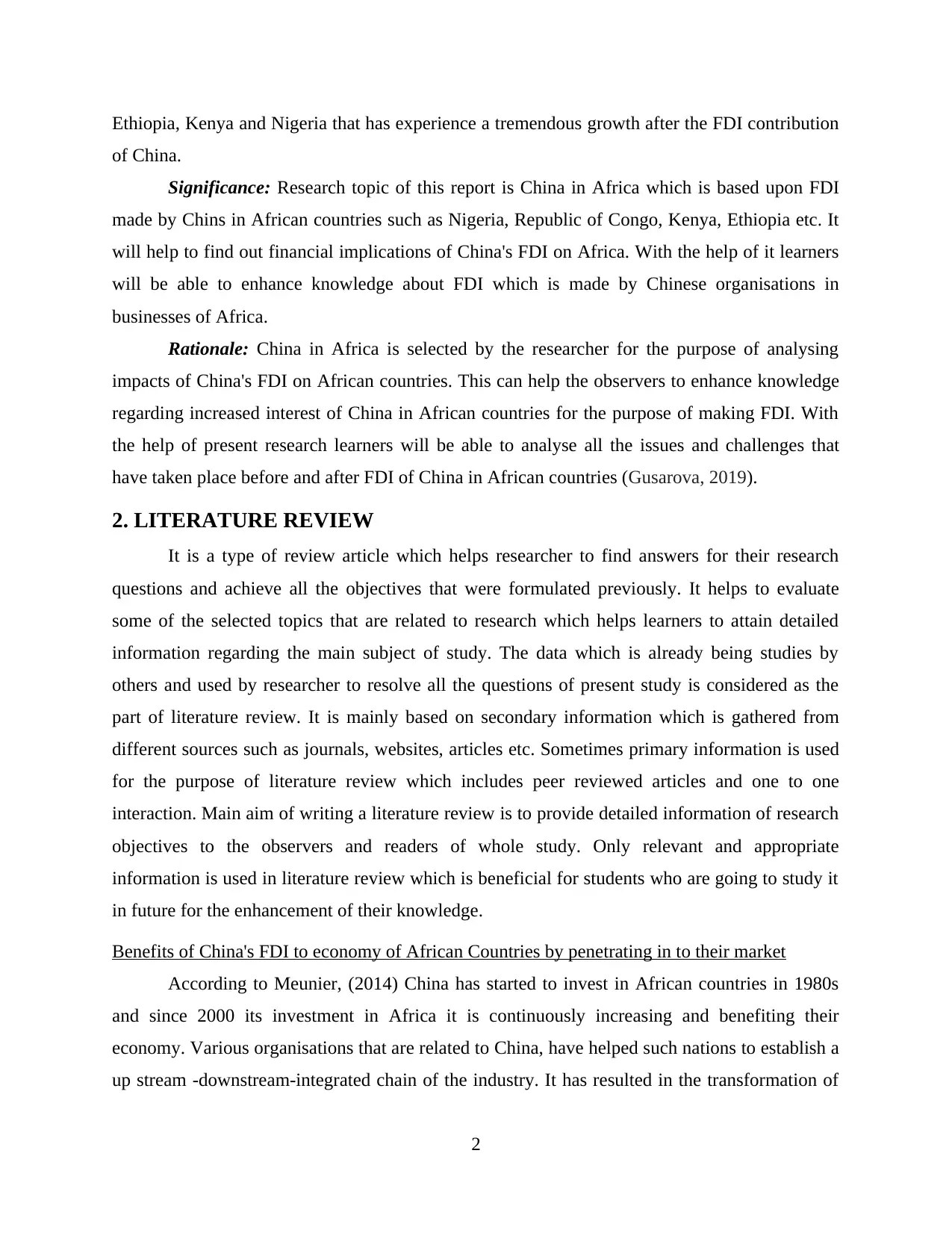
Ethiopia, Kenya and Nigeria that has experience a tremendous growth after the FDI contribution
of China.
Significance: Research topic of this report is China in Africa which is based upon FDI
made by Chins in African countries such as Nigeria, Republic of Congo, Kenya, Ethiopia etc. It
will help to find out financial implications of China's FDI on Africa. With the help of it learners
will be able to enhance knowledge about FDI which is made by Chinese organisations in
businesses of Africa.
Rationale: China in Africa is selected by the researcher for the purpose of analysing
impacts of China's FDI on African countries. This can help the observers to enhance knowledge
regarding increased interest of China in African countries for the purpose of making FDI. With
the help of present research learners will be able to analyse all the issues and challenges that
have taken place before and after FDI of China in African countries (Gusarova, 2019).
2. LITERATURE REVIEW
It is a type of review article which helps researcher to find answers for their research
questions and achieve all the objectives that were formulated previously. It helps to evaluate
some of the selected topics that are related to research which helps learners to attain detailed
information regarding the main subject of study. The data which is already being studies by
others and used by researcher to resolve all the questions of present study is considered as the
part of literature review. It is mainly based on secondary information which is gathered from
different sources such as journals, websites, articles etc. Sometimes primary information is used
for the purpose of literature review which includes peer reviewed articles and one to one
interaction. Main aim of writing a literature review is to provide detailed information of research
objectives to the observers and readers of whole study. Only relevant and appropriate
information is used in literature review which is beneficial for students who are going to study it
in future for the enhancement of their knowledge.
Benefits of China's FDI to economy of African Countries by penetrating in to their market
According to Meunier, (2014) China has started to invest in African countries in 1980s
and since 2000 its investment in Africa it is continuously increasing and benefiting their
economy. Various organisations that are related to China, have helped such nations to establish a
up stream -downstream-integrated chain of the industry. It has resulted in the transformation of
2
of China.
Significance: Research topic of this report is China in Africa which is based upon FDI
made by Chins in African countries such as Nigeria, Republic of Congo, Kenya, Ethiopia etc. It
will help to find out financial implications of China's FDI on Africa. With the help of it learners
will be able to enhance knowledge about FDI which is made by Chinese organisations in
businesses of Africa.
Rationale: China in Africa is selected by the researcher for the purpose of analysing
impacts of China's FDI on African countries. This can help the observers to enhance knowledge
regarding increased interest of China in African countries for the purpose of making FDI. With
the help of present research learners will be able to analyse all the issues and challenges that
have taken place before and after FDI of China in African countries (Gusarova, 2019).
2. LITERATURE REVIEW
It is a type of review article which helps researcher to find answers for their research
questions and achieve all the objectives that were formulated previously. It helps to evaluate
some of the selected topics that are related to research which helps learners to attain detailed
information regarding the main subject of study. The data which is already being studies by
others and used by researcher to resolve all the questions of present study is considered as the
part of literature review. It is mainly based on secondary information which is gathered from
different sources such as journals, websites, articles etc. Sometimes primary information is used
for the purpose of literature review which includes peer reviewed articles and one to one
interaction. Main aim of writing a literature review is to provide detailed information of research
objectives to the observers and readers of whole study. Only relevant and appropriate
information is used in literature review which is beneficial for students who are going to study it
in future for the enhancement of their knowledge.
Benefits of China's FDI to economy of African Countries by penetrating in to their market
According to Meunier, (2014) China has started to invest in African countries in 1980s
and since 2000 its investment in Africa it is continuously increasing and benefiting their
economy. Various organisations that are related to China, have helped such nations to establish a
up stream -downstream-integrated chain of the industry. It has resulted in the transformation of
2
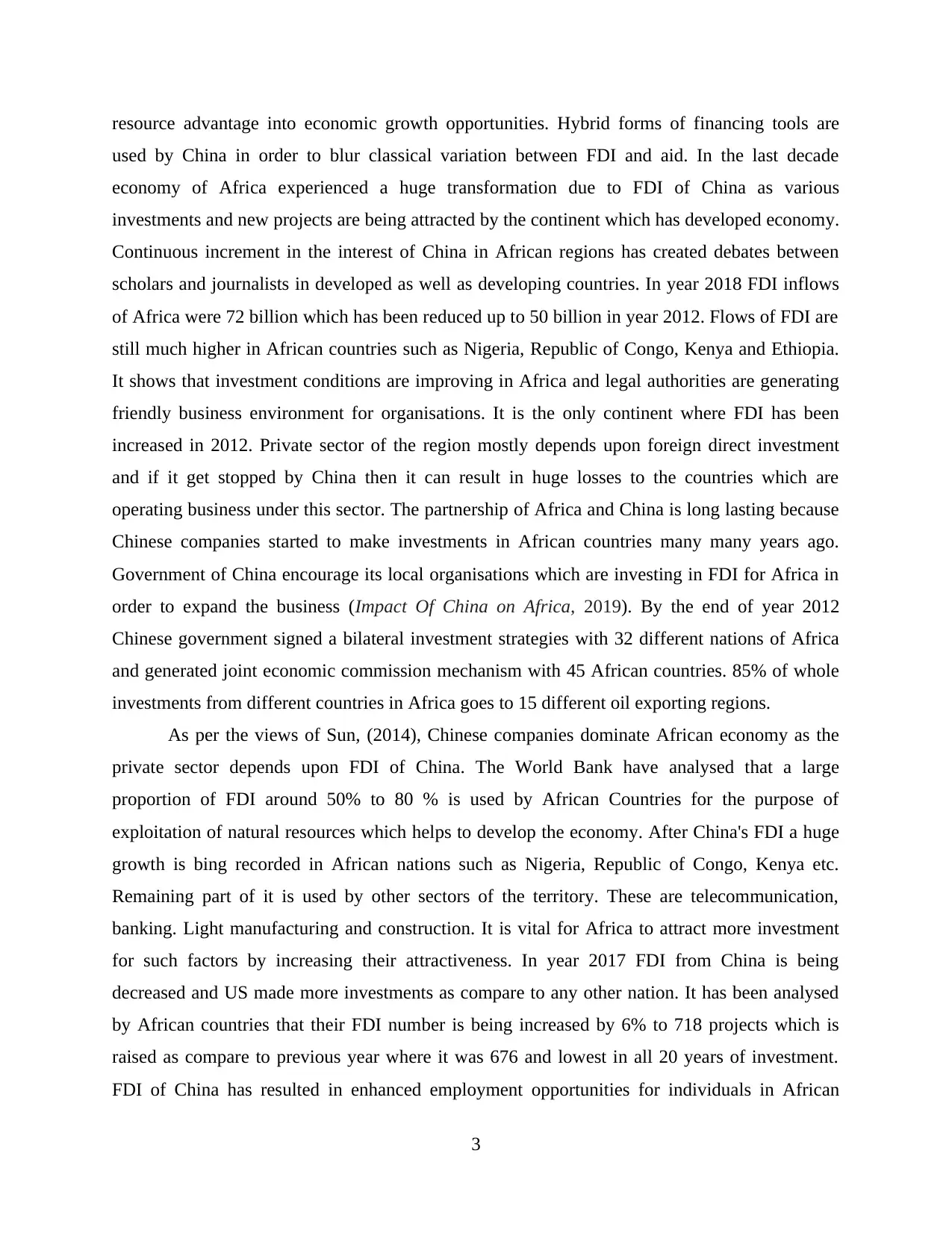
resource advantage into economic growth opportunities. Hybrid forms of financing tools are
used by China in order to blur classical variation between FDI and aid. In the last decade
economy of Africa experienced a huge transformation due to FDI of China as various
investments and new projects are being attracted by the continent which has developed economy.
Continuous increment in the interest of China in African regions has created debates between
scholars and journalists in developed as well as developing countries. In year 2018 FDI inflows
of Africa were 72 billion which has been reduced up to 50 billion in year 2012. Flows of FDI are
still much higher in African countries such as Nigeria, Republic of Congo, Kenya and Ethiopia.
It shows that investment conditions are improving in Africa and legal authorities are generating
friendly business environment for organisations. It is the only continent where FDI has been
increased in 2012. Private sector of the region mostly depends upon foreign direct investment
and if it get stopped by China then it can result in huge losses to the countries which are
operating business under this sector. The partnership of Africa and China is long lasting because
Chinese companies started to make investments in African countries many many years ago.
Government of China encourage its local organisations which are investing in FDI for Africa in
order to expand the business (Impact Of China on Africa, 2019). By the end of year 2012
Chinese government signed a bilateral investment strategies with 32 different nations of Africa
and generated joint economic commission mechanism with 45 African countries. 85% of whole
investments from different countries in Africa goes to 15 different oil exporting regions.
As per the views of Sun, (2014), Chinese companies dominate African economy as the
private sector depends upon FDI of China. The World Bank have analysed that a large
proportion of FDI around 50% to 80 % is used by African Countries for the purpose of
exploitation of natural resources which helps to develop the economy. After China's FDI a huge
growth is bing recorded in African nations such as Nigeria, Republic of Congo, Kenya etc.
Remaining part of it is used by other sectors of the territory. These are telecommunication,
banking. Light manufacturing and construction. It is vital for Africa to attract more investment
for such factors by increasing their attractiveness. In year 2017 FDI from China is being
decreased and US made more investments as compare to any other nation. It has been analysed
by African countries that their FDI number is being increased by 6% to 718 projects which is
raised as compare to previous year where it was 676 and lowest in all 20 years of investment.
FDI of China has resulted in enhanced employment opportunities for individuals in African
3
used by China in order to blur classical variation between FDI and aid. In the last decade
economy of Africa experienced a huge transformation due to FDI of China as various
investments and new projects are being attracted by the continent which has developed economy.
Continuous increment in the interest of China in African regions has created debates between
scholars and journalists in developed as well as developing countries. In year 2018 FDI inflows
of Africa were 72 billion which has been reduced up to 50 billion in year 2012. Flows of FDI are
still much higher in African countries such as Nigeria, Republic of Congo, Kenya and Ethiopia.
It shows that investment conditions are improving in Africa and legal authorities are generating
friendly business environment for organisations. It is the only continent where FDI has been
increased in 2012. Private sector of the region mostly depends upon foreign direct investment
and if it get stopped by China then it can result in huge losses to the countries which are
operating business under this sector. The partnership of Africa and China is long lasting because
Chinese companies started to make investments in African countries many many years ago.
Government of China encourage its local organisations which are investing in FDI for Africa in
order to expand the business (Impact Of China on Africa, 2019). By the end of year 2012
Chinese government signed a bilateral investment strategies with 32 different nations of Africa
and generated joint economic commission mechanism with 45 African countries. 85% of whole
investments from different countries in Africa goes to 15 different oil exporting regions.
As per the views of Sun, (2014), Chinese companies dominate African economy as the
private sector depends upon FDI of China. The World Bank have analysed that a large
proportion of FDI around 50% to 80 % is used by African Countries for the purpose of
exploitation of natural resources which helps to develop the economy. After China's FDI a huge
growth is bing recorded in African nations such as Nigeria, Republic of Congo, Kenya etc.
Remaining part of it is used by other sectors of the territory. These are telecommunication,
banking. Light manufacturing and construction. It is vital for Africa to attract more investment
for such factors by increasing their attractiveness. In year 2017 FDI from China is being
decreased and US made more investments as compare to any other nation. It has been analysed
by African countries that their FDI number is being increased by 6% to 718 projects which is
raised as compare to previous year where it was 676 and lowest in all 20 years of investment.
FDI of China has resulted in enhanced employment opportunities for individuals in African
3
⊘ This is a preview!⊘
Do you want full access?
Subscribe today to unlock all pages.

Trusted by 1+ million students worldwide
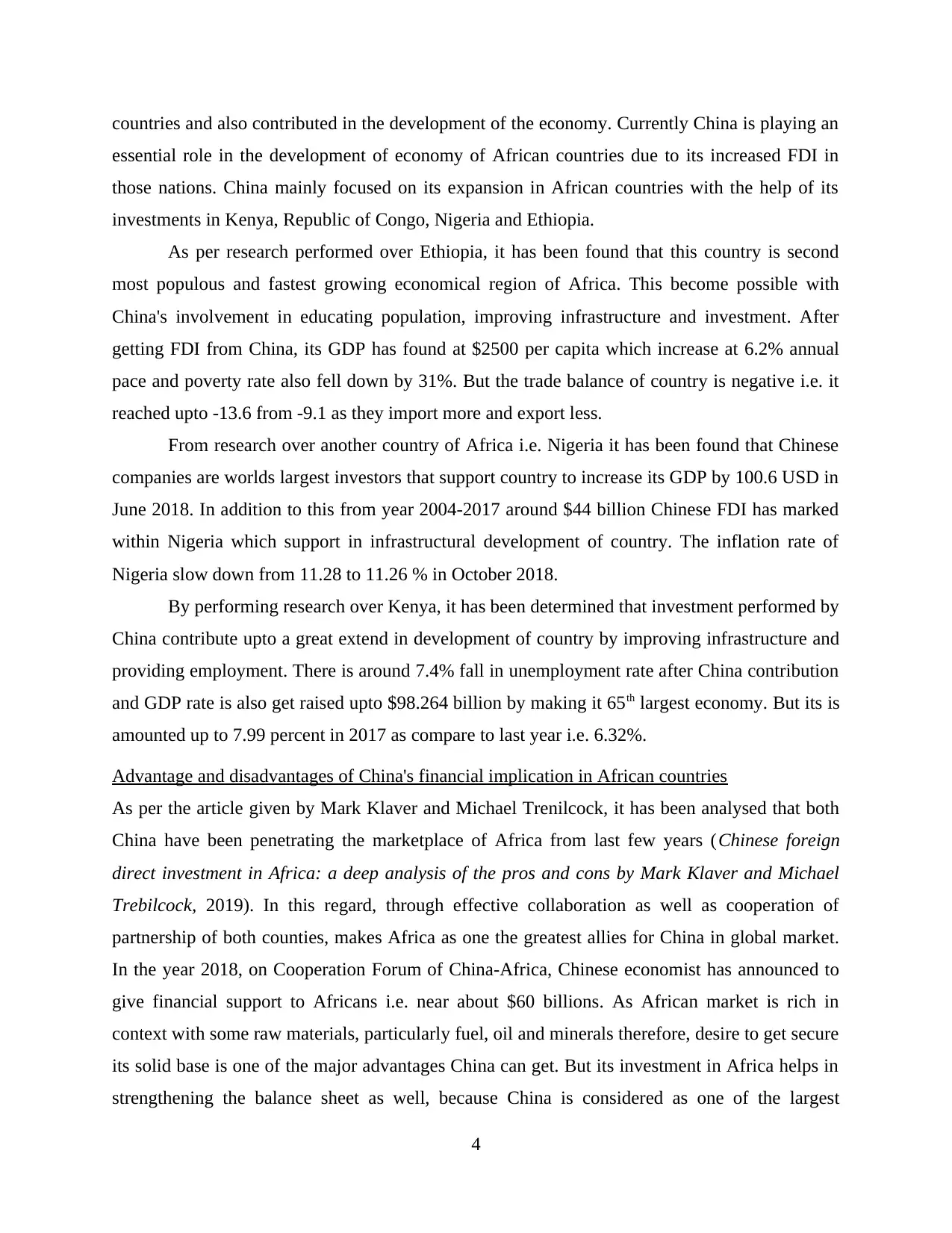
countries and also contributed in the development of the economy. Currently China is playing an
essential role in the development of economy of African countries due to its increased FDI in
those nations. China mainly focused on its expansion in African countries with the help of its
investments in Kenya, Republic of Congo, Nigeria and Ethiopia.
As per research performed over Ethiopia, it has been found that this country is second
most populous and fastest growing economical region of Africa. This become possible with
China's involvement in educating population, improving infrastructure and investment. After
getting FDI from China, its GDP has found at $2500 per capita which increase at 6.2% annual
pace and poverty rate also fell down by 31%. But the trade balance of country is negative i.e. it
reached upto -13.6 from -9.1 as they import more and export less.
From research over another country of Africa i.e. Nigeria it has been found that Chinese
companies are worlds largest investors that support country to increase its GDP by 100.6 USD in
June 2018. In addition to this from year 2004-2017 around $44 billion Chinese FDI has marked
within Nigeria which support in infrastructural development of country. The inflation rate of
Nigeria slow down from 11.28 to 11.26 % in October 2018.
By performing research over Kenya, it has been determined that investment performed by
China contribute upto a great extend in development of country by improving infrastructure and
providing employment. There is around 7.4% fall in unemployment rate after China contribution
and GDP rate is also get raised upto $98.264 billion by making it 65th largest economy. But its is
amounted up to 7.99 percent in 2017 as compare to last year i.e. 6.32%.
Advantage and disadvantages of China's financial implication in African countries
As per the article given by Mark Klaver and Michael Trenilcock, it has been analysed that both
China have been penetrating the marketplace of Africa from last few years (Chinese foreign
direct investment in Africa: a deep analysis of the pros and cons by Mark Klaver and Michael
Trebilcock, 2019). In this regard, through effective collaboration as well as cooperation of
partnership of both counties, makes Africa as one the greatest allies for China in global market.
In the year 2018, on Cooperation Forum of China-Africa, Chinese economist has announced to
give financial support to Africans i.e. near about $60 billions. As African market is rich in
context with some raw materials, particularly fuel, oil and minerals therefore, desire to get secure
its solid base is one of the major advantages China can get. But its investment in Africa helps in
strengthening the balance sheet as well, because China is considered as one of the largest
4
essential role in the development of economy of African countries due to its increased FDI in
those nations. China mainly focused on its expansion in African countries with the help of its
investments in Kenya, Republic of Congo, Nigeria and Ethiopia.
As per research performed over Ethiopia, it has been found that this country is second
most populous and fastest growing economical region of Africa. This become possible with
China's involvement in educating population, improving infrastructure and investment. After
getting FDI from China, its GDP has found at $2500 per capita which increase at 6.2% annual
pace and poverty rate also fell down by 31%. But the trade balance of country is negative i.e. it
reached upto -13.6 from -9.1 as they import more and export less.
From research over another country of Africa i.e. Nigeria it has been found that Chinese
companies are worlds largest investors that support country to increase its GDP by 100.6 USD in
June 2018. In addition to this from year 2004-2017 around $44 billion Chinese FDI has marked
within Nigeria which support in infrastructural development of country. The inflation rate of
Nigeria slow down from 11.28 to 11.26 % in October 2018.
By performing research over Kenya, it has been determined that investment performed by
China contribute upto a great extend in development of country by improving infrastructure and
providing employment. There is around 7.4% fall in unemployment rate after China contribution
and GDP rate is also get raised upto $98.264 billion by making it 65th largest economy. But its is
amounted up to 7.99 percent in 2017 as compare to last year i.e. 6.32%.
Advantage and disadvantages of China's financial implication in African countries
As per the article given by Mark Klaver and Michael Trenilcock, it has been analysed that both
China have been penetrating the marketplace of Africa from last few years (Chinese foreign
direct investment in Africa: a deep analysis of the pros and cons by Mark Klaver and Michael
Trebilcock, 2019). In this regard, through effective collaboration as well as cooperation of
partnership of both counties, makes Africa as one the greatest allies for China in global market.
In the year 2018, on Cooperation Forum of China-Africa, Chinese economist has announced to
give financial support to Africans i.e. near about $60 billions. As African market is rich in
context with some raw materials, particularly fuel, oil and minerals therefore, desire to get secure
its solid base is one of the major advantages China can get. But its investment in Africa helps in
strengthening the balance sheet as well, because China is considered as one of the largest
4
Paraphrase This Document
Need a fresh take? Get an instant paraphrase of this document with our AI Paraphraser
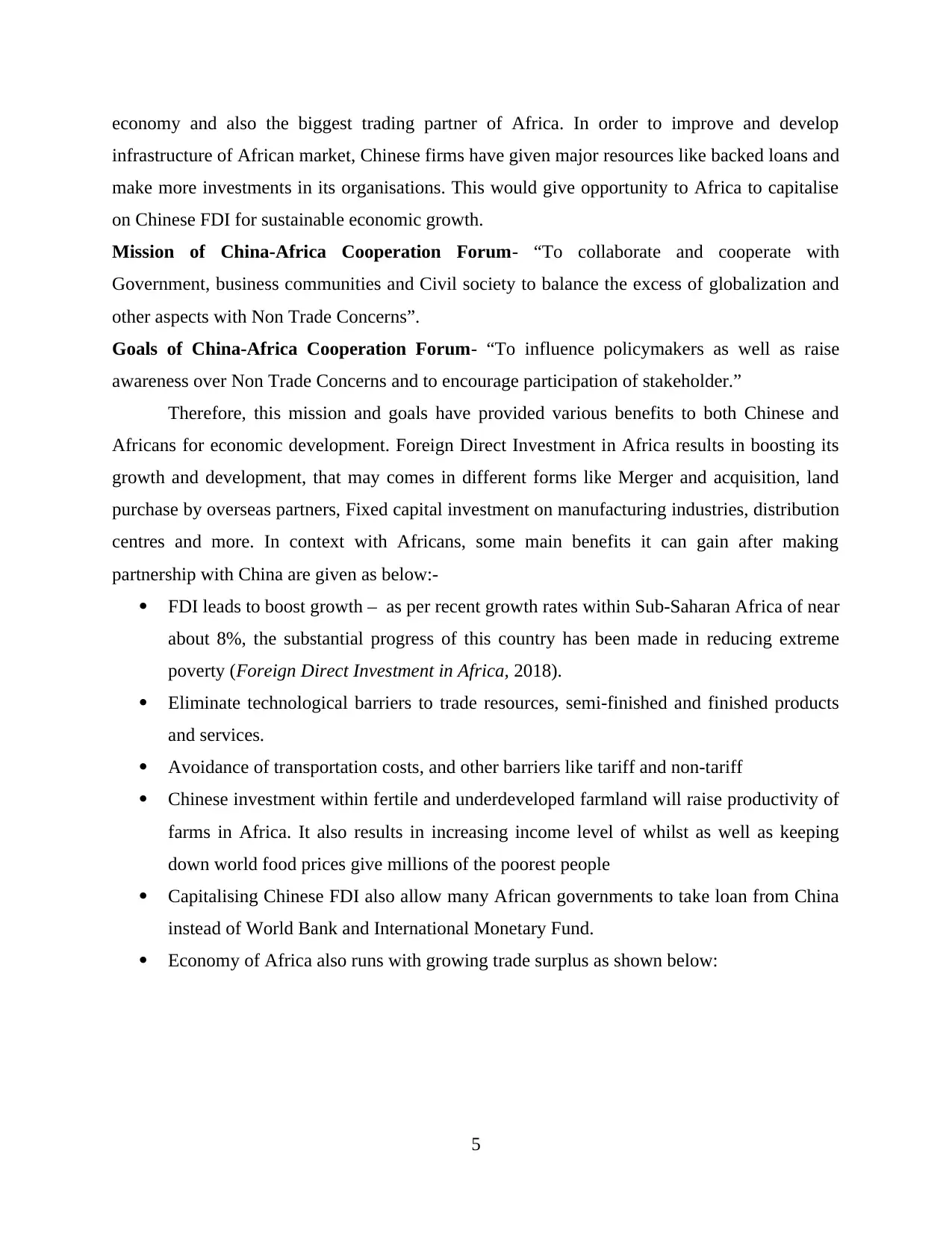
economy and also the biggest trading partner of Africa. In order to improve and develop
infrastructure of African market, Chinese firms have given major resources like backed loans and
make more investments in its organisations. This would give opportunity to Africa to capitalise
on Chinese FDI for sustainable economic growth.
Mission of China-Africa Cooperation Forum- “To collaborate and cooperate with
Government, business communities and Civil society to balance the excess of globalization and
other aspects with Non Trade Concerns”.
Goals of China-Africa Cooperation Forum- “To influence policymakers as well as raise
awareness over Non Trade Concerns and to encourage participation of stakeholder.”
Therefore, this mission and goals have provided various benefits to both Chinese and
Africans for economic development. Foreign Direct Investment in Africa results in boosting its
growth and development, that may comes in different forms like Merger and acquisition, land
purchase by overseas partners, Fixed capital investment on manufacturing industries, distribution
centres and more. In context with Africans, some main benefits it can gain after making
partnership with China are given as below:-
FDI leads to boost growth – as per recent growth rates within Sub-Saharan Africa of near
about 8%, the substantial progress of this country has been made in reducing extreme
poverty (Foreign Direct Investment in Africa, 2018).
Eliminate technological barriers to trade resources, semi-finished and finished products
and services.
Avoidance of transportation costs, and other barriers like tariff and non-tariff
Chinese investment within fertile and underdeveloped farmland will raise productivity of
farms in Africa. It also results in increasing income level of whilst as well as keeping
down world food prices give millions of the poorest people
Capitalising Chinese FDI also allow many African governments to take loan from China
instead of World Bank and International Monetary Fund.
Economy of Africa also runs with growing trade surplus as shown below:
5
infrastructure of African market, Chinese firms have given major resources like backed loans and
make more investments in its organisations. This would give opportunity to Africa to capitalise
on Chinese FDI for sustainable economic growth.
Mission of China-Africa Cooperation Forum- “To collaborate and cooperate with
Government, business communities and Civil society to balance the excess of globalization and
other aspects with Non Trade Concerns”.
Goals of China-Africa Cooperation Forum- “To influence policymakers as well as raise
awareness over Non Trade Concerns and to encourage participation of stakeholder.”
Therefore, this mission and goals have provided various benefits to both Chinese and
Africans for economic development. Foreign Direct Investment in Africa results in boosting its
growth and development, that may comes in different forms like Merger and acquisition, land
purchase by overseas partners, Fixed capital investment on manufacturing industries, distribution
centres and more. In context with Africans, some main benefits it can gain after making
partnership with China are given as below:-
FDI leads to boost growth – as per recent growth rates within Sub-Saharan Africa of near
about 8%, the substantial progress of this country has been made in reducing extreme
poverty (Foreign Direct Investment in Africa, 2018).
Eliminate technological barriers to trade resources, semi-finished and finished products
and services.
Avoidance of transportation costs, and other barriers like tariff and non-tariff
Chinese investment within fertile and underdeveloped farmland will raise productivity of
farms in Africa. It also results in increasing income level of whilst as well as keeping
down world food prices give millions of the poorest people
Capitalising Chinese FDI also allow many African governments to take loan from China
instead of World Bank and International Monetary Fund.
Economy of Africa also runs with growing trade surplus as shown below:
5
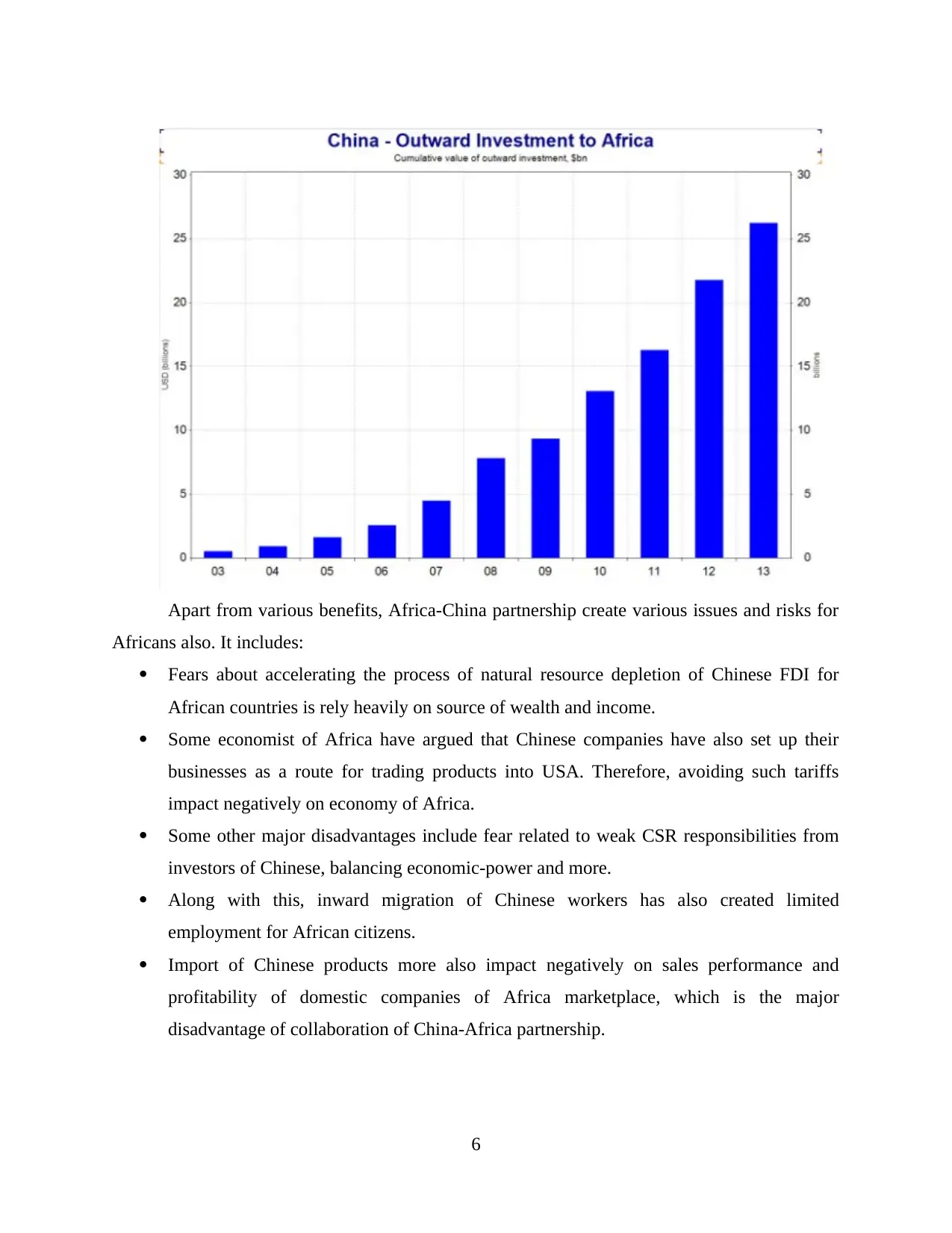
Apart from various benefits, Africa-China partnership create various issues and risks for
Africans also. It includes:
Fears about accelerating the process of natural resource depletion of Chinese FDI for
African countries is rely heavily on source of wealth and income.
Some economist of Africa have argued that Chinese companies have also set up their
businesses as a route for trading products into USA. Therefore, avoiding such tariffs
impact negatively on economy of Africa.
Some other major disadvantages include fear related to weak CSR responsibilities from
investors of Chinese, balancing economic-power and more.
Along with this, inward migration of Chinese workers has also created limited
employment for African citizens.
Import of Chinese products more also impact negatively on sales performance and
profitability of domestic companies of Africa marketplace, which is the major
disadvantage of collaboration of China-Africa partnership.
6
Africans also. It includes:
Fears about accelerating the process of natural resource depletion of Chinese FDI for
African countries is rely heavily on source of wealth and income.
Some economist of Africa have argued that Chinese companies have also set up their
businesses as a route for trading products into USA. Therefore, avoiding such tariffs
impact negatively on economy of Africa.
Some other major disadvantages include fear related to weak CSR responsibilities from
investors of Chinese, balancing economic-power and more.
Along with this, inward migration of Chinese workers has also created limited
employment for African citizens.
Import of Chinese products more also impact negatively on sales performance and
profitability of domestic companies of Africa marketplace, which is the major
disadvantage of collaboration of China-Africa partnership.
6
⊘ This is a preview!⊘
Do you want full access?
Subscribe today to unlock all pages.

Trusted by 1+ million students worldwide
1 out of 36
Related Documents
Your All-in-One AI-Powered Toolkit for Academic Success.
+13062052269
info@desklib.com
Available 24*7 on WhatsApp / Email
![[object Object]](/_next/static/media/star-bottom.7253800d.svg)
Unlock your academic potential
Copyright © 2020–2026 A2Z Services. All Rights Reserved. Developed and managed by ZUCOL.




